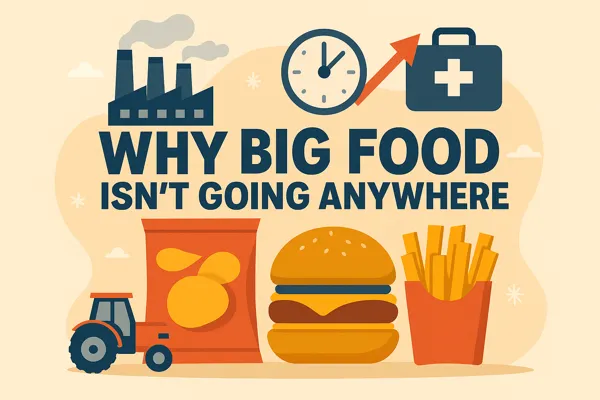
Big Food Isn't Going Anywhere (Even If It's Killing Us)
Why Big Food Isn’t Going Anywhere (Even If It’s Killing Us)
A recent study revealed that the UK now has the highest rate of premature deaths linked to ultra-processed foods (UPFs) in the world - nearly 14%.
It’s a shocking statistic, but if you think this will change how the food system operates, think again.
Big Food isn’t just a health issue - it’s an economic engine.
From job creation to time-saving to healthcare revenue, ultra-processed food is deeply embedded in the way modern economies function.
In this post, we break down why Big Food isn’t going anywhere, and what that means for businesses and policymakers alike.
The Automation Era and the New Role of Food
In the post-war years, much of the workforce was tied to “essential” labour - digging coal, working farms, or staffing factories.
But today, technology has dramatically reduced the need for human hands in core sectors.
Despite that, the size of the labour force has doubled - thanks to the rise in women in paid employment and immigration-driven growth.
To keep people economically active, we’ve created new industries. One of the most significant? Ultra-processed food.
1. Big Food Creates Jobs Across Huge Supply Chains
Let’s take the humble potato.
If we shipped raw potatoes to homes, a few farmers and drivers would suffice.
But we don’t. We turn them into:
Crisps
French fries
Tinned soups
Pre-made mash
Potato starch
Alphabet-shaped smiley faces
And thousands more products.
Every product spawns entire industries - food scientists, heavy machinery, engineers, marketers, packagers, cold chain logistics, factory cleaners, and compliance officers.
Remove ultra-processing and you collapse entire supply chains.
Big Food replaced heavy industry as a major employer.
Without it we’d be facing mass unemployment across dozens of sectors that exist solely to support it.
2. Big Food Frees Up Time - And Time Drives the Economy
Cooking from scratch takes 10 to 17 hours per week. Prepped or ultra-processed food reduces that to 3 to 7 hours.
That time isn’t just free time - it’s revenue-generating time:
Extra work hours = more productivity (in theory)
More screen time = more ad exposure
More convenience = more impulse spending
Big Tech depends on us being online.
The attention economy doesn’t thrive when we’re chopping vegetables - it thrives when we’re swiping, scrolling, and buying.
3. Obesity Isn’t Just a Crisis - It’s a Cash Cow
Ultra-processed foods are a leading cause of obesity, diabetes, and heart disease. But these chronic illnesses also power the healthcare economy:
Hospitals and GP clinics
Pharma and supplement companies
Fitness apps, gyms and weight-loss programs
Private care homes and long-term care providers
Billions are spent treating the preventable fallout of modern diets.
Every blood test, prescription, and surgical procedure supports a web of jobs and infrastructure.
It’s a grim truth: chronic illness is economically useful.
What Happens If We Fix This?
Imagine a society that eats real food, stays healthy, and rarely needs medical intervention.
Sounds great. But then what?
Who replaces the millions of jobs lost across food and health sectors?
What fills the economic gap if people stop buying, scrolling, and medicating?
Can we restructure the economy around health instead of damage control?
Big Food isn't just an industry - it's a pillar holding up the way we currently live and work.
Final Thoughts
If you run a business, market consumer goods, or work in tech or health or are part of the growing anti UPF it’s essential to understand this deeper dynamic:
✅ Big Food saves time
✅ Big Food creates jobs
✅ Big Food fuels healthcare
❌ Big Food damages public health
But until we rethink the structure of our economy, none of that is going to change. The system isn’t broken - it’s doing exactly what it was designed to do.
If the anti-UPF movement wants to make radical change then we need to factor in what Big Food does and provide an economically suitable alternative otherwise it will remain a niche middle class movement.
If you’re as fascinated (or frustrated) by this system as I am, join the list.
I share new ideas, questions, and behind-the-scenes thinking a couple of times a month. No fluff. Just food, systems, and solutions.
Leave Your Email Below To Join The List